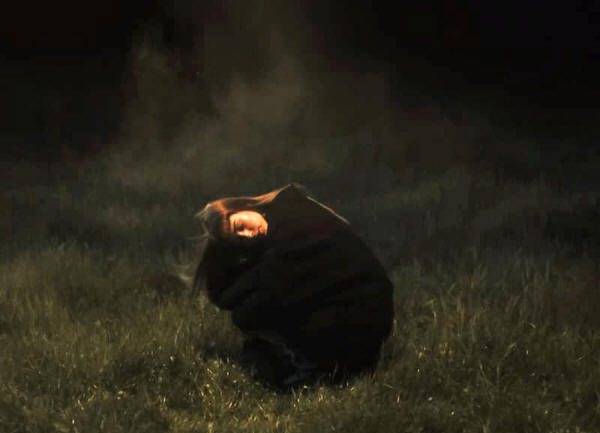|

by
Aletheia Luna
February 04,
2022
from
LonerWolf Website

Your body speaks to you in a thousand ways each day,
and illness is no exception.
As one of the most frustrating, draining, and in some cases,
debilitating experiences you can have in life, sickness can leave
you feeling helpless.
And if you continually receive negative results on tests with no
clear underlying cause for what you're going through, your illness
can be even more infuriating and insufferable.
I am not a medical doctor and I'm not prescribing medical advice
here, but I have experienced numerous "unsolved" illnesses before
with no clear biological cause.
What I've learned is something that many medical professionals now
agree on and studies prove: that the mind and body are intimately
connected.
Not only that, but our aches, pains, and health struggles can
actually be a spiritual wake-up call if we learn to observe them
deeply enough. (This is
spiritual psychology 101.)
I'll explain why our
illness can be a wakeup call in this article - and what healing
avenues might bring you some relief.
What is a
Psychosomatic Illness?

A
psychosomatic illness is an illness
for which there are no biological causes, such as,
physical injuries,
hormonal imbalances, viruses, etc...
In other words, a
psychosomatic illness is an illness triggered by a mental state such
as,
-
anxiety
-
stress
-
anger
-
depression,
...and so on.
Perhaps more simply,
a psychosomatic
illness - psycho meaning mind and somatic meaning body
- is a mind-body ailment...
"It's All in Your Mind"

Please note that just because a psychosomatic illness is triggered
by a mental state such as grief, fear, and so on, it doesn't mean
that it's "not real."
As one who has suffered from psychosomatic illnesses such as,
...I know how painfully
real such experiences can be.
If you can't seem to pinpoint the exact cause of your physical
suffering, and if all the tests come back saying everything is
"normal," it doesn't mean you're delusional or a hypochondriac.
Instead, it likely means
that your illness is psychosomatic in nature.
Not only that but likely, some kind of trauma may be the underlying
cause.
Trauma and
Psychosomatic Illness

The body
keeps the score...
the memory of
trauma is encoded
in the viscera,
in heartbreaking
and
gut-wrenching emotions,
in autoimmune
disorders and
skeletal/muscular problems.
Bessel
Van Der Kolk, MD
(The
Body Keeps the Score - Brain, Mind, and Body in the Healing of
Trauma)
When we're traumatized - whether as a child or as an adult (or both)
- we often haven't been able to recover from something known as the
freeze response.
I'm sure you've heard of the fight, flight, and freeze response
before. Such behavior has been studied by sociologists,
psychologists, anthropologists, zoologists, and so on for a long
time.
The fight response happens when our body's sympathetic nervous
system is triggered, generating adrenaline that makes us want to
attack, kick, punch, and so on.
Think of a person
getting into a street fight.
The flight response happens when we have the irresistible urge
to flee: to run away as fast as we can.
Think of a zebra that
is being chased by a lion in the wild.
The freeze response, on
the other hand, immobilizes us in the immediate threat of death or
pain (whether physical/mental/emotional) so intolerable that we shut
down.
Clinical psychologist and trauma researcher Peter Levine says
that freezing helps to offer a reprieve from the pain of death (as a
natural analgesic).
But also, if we don't
manage to shake off that freeze response from our nervous systems,
we become traumatized.
Levine writes in "Waking
the Tiger - Healing Trauma":
...trauma occurs as a
result of the initiation of an instinctual cycle that is not
allowed to finish. When the neocortex overrides the instinctual
responses that would initiate the completion of this cycle, we
will be traumatised.
In other words, we need
to be able to "complete the cycle" (or shake off the energy and
return back to normal) within us to discharge the intense energy
generated by the life-threatening (or chronically endangering)
situation we experienced.
If we don't, if our
neocortex (thinking brain) takes over and mentally spirals, we
experience what I'll crassly call the "blue ball" effect.
The blue ball effect happens when our nervous systems become frozen
full of so much undischarged energy that this causes us to stay in a
traumatized state.
(On a side note, observe
animals in nature that have experienced a traumatic brush with
death. What is the first thing they do? They shake off the energy,
and so must we according to Levine.)
How does this frozen trauma manifest?
Like a valve on a
pressure cooker, there must be some kind of release for this
pent-up inner energy.
The result is - you
guessed it!,
the occurrence of
psychosomatic illness (often accompanied by mental
and emotional disorders)...
Psychosomatic
Illness Examples

So what types of psychosomatic illnesses are there?
It would be impossible to list them all, but I'll give a few
examples below:
-
Insomnia
-
Fibromyalgia
-
Chronic Fatigue
Syndrome
-
Chronic muscle
tension
-
Heart
palpitations
-
High blood
pressure
-
Skin issues
(acne, dermatitis, etc.)
-
Gastrointestinal
issues (e.g., Irritable Bowel Syndrome, indigestion)
-
Sexual
dysfunction (e.g., erectile dysfunction)
-
Headaches and
migraines
-
Pelvic floor
issues
Essentially,
psychosomatic illnesses can impact any area of your body,
whether inside or outside.
A Call to Adventure

As distressing as psychosomatic disorders are, there's a deep
calling inherent in them:
They're a call to
awaken the healer within us; to go
soul searching, uncover what is
distressing us, listen to our soul's deeper needs, and find
freedom again.
Of course, some people
might understandably be skeptical about attributing any "higher"
meaning to their illness.
That is fine, at the end
of the day we've got to take what resonates and throw away the rest.
But I've personally found, not just with myself but others too, that
unveiling the deeper meaning behind our suffering and seeing it as
what mythologist Joseph Campbell calls "a call to adventure"
is empowering and healing.
Holocaust survivor, neurologist, and psychiatrist Viktor Frankl
refers to the transformative power of finding meaning "logotherapy."
Indeed, finding a deeper
purpose behind his own horrific pain and trauma in the Nazi death
camps helped him to survive, and eventually, find the will to
thrive.
Pain as a
Spiritual Wake-Up Call

To build on top of the previous section, another reason why pain can
manifest in our bodies is that it is serving as a spiritual wake-up
call.
So many of us live our lives constantly dissociated from our bodies,
disconnected from the present moment, and living in the world of the
mind.
Such an existence is what
Buddhists would call "dukkha," that is, fundamentally unsatisfying,
stressful, and empty.
If along with physical pain, you regularly experience sensations of
feeling empty inside, feeling alone, and feeling like you're lost in
life, your physical suffering may be serving as a loud spiritual
wake-up call.
Perhaps hearing that our pain is a wake-up call may sound a little
silly, crazy, or even sadistic to you.
"Right. But isn't
there a better, more gentle way of having a 'wake-up' call?!" we
might protest.
The answer is that when
we're profoundly entrenched in mental stories, emotional
programming, and various forms of negative societal conditioning,
sometimes the only thing that can get our attention is pain - and a
lot of it!
After all,
How else would you
wake someone up who was deeply asleep?
Would you gently
whisper to them?
Probably not. They
wouldn't hear you!
No, you'd probably speak
loudly or even shake them awake!
The same is true of
psychosomatic illnesses, they shake us to awake us!
How to
Discover What Your Psychosomatic Illness is "Trying to Tell You"

So,
What is the hidden
message behind your pain?
What is it trying to
tell or teach you?
Of course, pain can
sometimes just be pain - its function may simply be to get your
attention so you can alleviate it, and that's it.
But sometimes
psychosomatic pain has a lesson or message for you.
It might, for instance,
teach you about:
-
The undigested
emotions associated with it
-
The unmetabolized
trauma you need to process
-
A decision in
your life that you need to examine
-
Something you
need to let go of ASAP
-
A part of your
shadow self that you need to explore
-
A negative habit
you need to correct
-
An opportunity
for self-love and self-care you can take
-
An ancestral
wound you're carrying
Keep in mind the above
list isn't exhaustive and there could be many other lessons buried
in your pain.
So,
how do you discover
what your psychosomatic illness is trying to tell you?
The best methods I've
found are journaling, meditation, visualization, and
breathwork.
Here are some practices
you can try:
-
The hand-resting
technique (best for specific pain). Get into a relaxed
state.
Close your eyes.
Place your hands over the part of your body that is causing
you pain. Send some mindful, soft breaths into that area to
release any tension.
Then ask
internally or out loud, "What are you trying to tell me?"
Note any
memories, flickering images, words, or sensations that
bubble up on the surface of your mind.
You can take this
mental material and journal about it and ask further
clarifying questions such as "What does that mean?"
-
The body
journeying visualization. In this visualization, you'll be
meeting your bodily pain as personified by a garden and a
gardener.
Relax by lying
down somewhere and listening to soft ambient music (sounds
of nature are the best to add to the experience). Imagine
that you're standing in a field full of soft grass swaying
in the wind.
In the distance
is a tall gate with a long fence stretching out either side.
You can't see
what's behind it so you move closer. As you go to open the
heavy gate you notice a sign hanging off it saying "Welcome
to Your Body."
You swing open
the gate and peer into the garden in front of you.
What does it look
like? What stands out to you?
Take a moment to
look around and acclimatize yourself. Suddenly, in the
distance, a gardener approaches you. He or she says, "Hello,
welcome to this garden."
You then ask
whatever questions you'd like to know the answers to. For
instance, you might ask, "What do I need to know about how
to take care of this garden (my body)?" "What does [x,y,z]
part of the garden mean?" and so on.
Once you've
finished the conversation, thank the gardener and leave the
garden, closing the gate behind you. Once you're back in the
grassy field, return to normal consciousness.
Journal about
what you learned.
-
The body
dialoguing journaling technique.
Dialoguing with
your body can be a simple but illuminating way of uncovering
the meaning and lessons behind your psychosomatic illness.
Begin your journaling session by addressing the part of your
body causing trouble (or whole body if it's generalized
pain).
You may like to
write, "Dear back, neck, chest, etc. what would you like to
share with me?"
Close your eyes,
let go of any thoughts in your mind and let yourself write
without stopping (this is also known as the stream of
consciousness technique).
Try not to judge
yourself, correct your spelling, or stop for any reason,
just let your writing flow unhindered. Once you've stopped,
think of another question to ask your body. Keep the
conversation flowing until you are satisfied.
Thank your body
at the end.
Reflect on your
discoveries.
Sometimes it takes a
little practice to tune into the voice of your illness and create
that mind-body connection.
But choose one practice
and keep at it - you might be wildly surprised by what you discover!
How to Release
Psychosomatic Trauma

Trying to
suppress or eradicate
symptoms on the
physical level
can be extremely
important,
but there's more
to healing than that;
dealing with
psychological, emotional
and spiritual
issues involved
in treating
sickness
is equally
important.
Marianne
Williamson
As I mentioned earlier, psychosomatic illnesses are often caused by
unreleased/unresolved trauma in the mind and frozen in the body.
Some psychologists refer
to this as "somatization" which is when our inner states of anxiety,
heartbreak, and anger are converted into physical distress in the
body.
Releasing this frozen energy often requires professional assistance,
such as EMDR (Eye Movement Desensitization and Reprocessing) or
Somatic Experiencing psychotherapy.
But to equip you with some resources in the meantime, I want to
offer you some ways you can experience relief:
-
Hydrate properly
-
Take an inventory
of what you eat (aka. what unhealthy foods can you eliminate
and replace with more wholesome options?)
-
Exercise each
day, even if that just involves gardening or housework
-
Try breathwork
techniques that help to soothe the mind and body (e.g.,
pranayama or yogic breathing like Nadi Shodhana)
-
Practice
consciously shaking your body - explore TRE or the
Tension and Trauma Release Exercise
-
Do self-massage
each day (my favorite tools are the
acuball, acupuncture
mat, and
theracane)
-
Make sleep your
priority
-
Practice
mindfulness and meditation (progressive muscle relaxation
and body scanning may be particularly helpful for you)
-
Do some gentle
stretching or yoga each day (my favorite simple asanas
for body pain are cat-cow, child's pose, seated twist,
butterfly pose, and seated forward fold)
-
Walk barefoot in
nature (if you have grass in your backyard or live near the
ocean, let the grounding energy of the earth soothe your
body!)
I can't promise that any
of these practices will be a "magic solution" for you, but they have
certainly helped me and those I know of who have suffered
psychosomatic illnesses.
Final Words
Chronic illness can make us feel debilitated, confused, and weak.
And yet, for some, it
can trigger a positive
existential crisis - a quest
for healing or a call to adventure that awakens the healer
within them.
For others, psychosomatic illnesses are like wake-up calls that
shake us out of our normal autopilot state and sparks the desire
to go soul searching.
Whatever meaning you
attribute to your illness (or not), just know that it can be
transformed into a 'sacred wound' that enables you to grow and
evolve.
Zen master
Thich Nhat Hanh once wrote
about "bells of mindfulness" that occur in our everyday lives, and
pain is most certainly one of them...!
|










